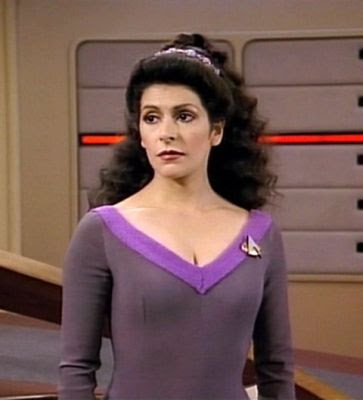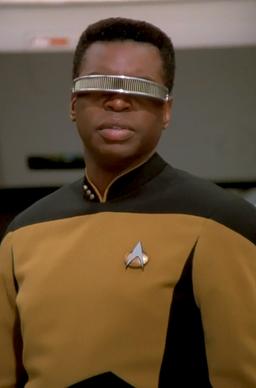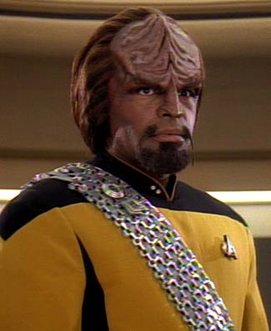
I don’t really have to write an intro to this one, do I? Really? All right then, if you insist. Having become their biggest moneyspinner by a long way, Paramount's
Star Trek was, and still is, shown somewhere around the world something like every three seconds, a massive, almost unbelievable feat not only for a science-fiction drama, but for one which faced the threat of cancellation each season in its original run, and which was cancelled in 1970, only to provoke a massive backlash from its legions of fans, leading to its syndication and its becoming one of, if not the, most popular cult series in television history.
But that was a long time ago, and Paramount executives, though happy by and large with the returns from the, to that point, four motion pictures which they had managed to spinoff from the original series, were beginning to balk at the kind of money William Shatner, Leonard Nimoy and the stars of the show were looking for to take part in the fourth film. They believed the time had come for a new take on
Star Trek, and so
Star Trek: The Next Generation was born.
In order that the new series --- which they had no idea would succeed never mind become popular --- not overshadow the movies, they decided to cast at the time unknowns into the starring roles, creating in the process, did they but know it, stars and icons of the future. The original
Star Trek had been, in many ways, quite sexist, with only two main crew members female and those not exactly in positions of power, to say nothing of the miniskirts and go-go boots the ladies were obliged to wear! Attitudes towards women had changed over twenty years --- or at least, Paramount wanted their audience to think they had --- and anyway Kirk and Co. had plied their trade in the twenty-third century, whereas this new series would take place in the twenty-fourth, and it was hoped that by then (if not already in the 22nd century!) there would be more equality between the sexes with less emphasis on gender and more on ability, so that even a woman could captain a starship, as she did, to our cost, in the third spinoff,
Star Trek Voyager.
But to address this “balancing of the genders”, writer and creator Gene Roddenberry and co-executive producer Rick Berman had to look closely at the original series and see where they wanted to make changes. The first, and most obvious of these is in the opening monologue. The same starship name was used, the
USS Enterprise of
Star Trek: The Next Generation being seen as a direct descendant, if you will, of NCC-1701, the iconic vessel which carried Kirk, Spock and their crew through three seasons of adventures, but the original voiceover, which stated “where no man has gone before”, was changed to now read “where no-one has gone before.” In addition, the ship’s doctor was a woman, as was its security chief. In this way, the writers had instantly established women in positions of both authority and trust.
But though they wanted the show to obviously echo the original they did not want a rehash. There was to be no Kirk for the 1980s. Instead, they chose Patrick Stewart as the bald-headed, slightly grumpy and stiff Captain Picard, with the more dashing Riker as his second-in-command. Another woman joined the team, in a position new to the
Star Trek universe, the ship’s counsellor. The original series had based much of its drama around the central character of Spock, the Vulcan who did not show emotion and judged everything by cold clinical logic. NextGen sort of turned that idea on its head by introducing the character of Data, an android who was indistinguishable from a human other than the fact that his skin was much paler. He, however, having no emotions at all, longed to experience these, and was on a quest to “become human”, in a twenty-fourth century update of the Pinocchio tale.
Another major difference, separating the original from the new series, was the treatment of the Klingons. In original
Trek, they had been mostly cartoon villains, despots and tyrants, a soldier race intent on conquering the galaxy and the sworn enemies of the Federation. By the time of
NextGen however there had been a great war and the Klingons were now allies with the humans, so much so that one served aboard the new Enterprise. This sympathetic view of the aliens would lead to many excellent storylines, and flesh out and develop the mythology, culture and history of a race who until now had been one-dimensional bad guys but who would become an important and integral part of the
Star Trek franchise.
NextGen started out well, and ratings were high, but after expending it seemed all their ideas and energy on the feature-length pilot episode, the writers fell back on rehashing old plots from the original series. “The naked time” from original
Trek became “The naked now”, with a razor-thin difference to the original story, so much so that they actually referenced it within the episode. “The big goodbye” revisited the original’s often annoying habit of either going back in time or putting the characters on a planet which mimicked a certain time period in history, in this case season two’s “A piece of the action”, while “When the bough breaks” bears many similarities in tone and feel to “And the children shall lead.” However within even the first season were some pretty damn fine episodes: “Hide and Q”, where the omnipotent being who put the crew on trial in the pilot resurfaced, comes to mind, as does later episode “Heart of glory”, which explored the mythology of the Klingon race, and even “Datalore”, in which Data finds out he has a brother --- and he’s evil!
As the series found its feet in season two it went from strength to strength, becoming one of the most respected sci-fi shows on TV. Well, in fairness for a time it was the
only sci-fi show on TV, unless you count
Doctor Who, which had been going for yonks and which nobody in America seemed to know of or care about. But by the end of its seventh and final season,
Star Trek: The Next Generation had done what nobody had really thought it was or could be capable of when it began: it had eclipsed the original series. Now, when people spoke of
Star Trek, they thought of or mentioned Riker, Picard and Data as often as they did Kirk and Spock. While certainly not banished to the dusty annals of history,
Star Trek’s original series had been bettered and had a new and vibrant life which would go on to spawn five more specifically NextGen-centric movies and two completely new series.
MAIN CAST
Generally speaking the cast that began the series were there at the end, though there were a few changes along the way. Starfleet being essentially a military organisation, there were also promotions and when these occur I will note them in the episode in which the event takes place. For now though, this is the main cast who first took to space in 1987, almost twenty years after the last voyage of the original
USS Enterprise.
 CAPTAIN JEAN-LUC PICARD,
CAPTAIN JEAN-LUC PICARD, played by
Patrick Stewart: With the quiet authority of the headmaster, and a frown and biting rebukes to match, Picard is almost the antithesis of the everyman, one-of-the-boys captain played by William Shatner. In many ways he is lonely and isolated, though through choice, as he does not get on terribly well with people, preferring instead the company of an old book or starship manual. He speaks with a distinct English accent, despite his stated French origins, and was the first character, so far as I know --- certainly the first male --- in Star Trek not to have any hair. He demands unswerving, unquestioning loyalty from his crew --- and gets it --- and has no interest in or time for children. He is not a family man, as he whines to his s-i-c in the first episode, asking “Why has Starfleet seen fit to give me a command with children and families?”
 COMMANDER WILLIAM T. RIKER,
COMMANDER WILLIAM T. RIKER, played by
Jonathan Frakes: First Officer of the Enterprise, he serves both as Picard’s second in command and a balance to check him on. When Picard wants to go down to a planet surface or otherwise put himself in danger, perhaps unnecessarily, it is Riker’s job to remind him that the captain’s first duty and responsibility is to the ship and its crew. He is a decorated officer, sought-after and well liked, though he can be a little arrogant, especially in season one. His appearance would change over the series, as would his attitude. (Note: in the first season Riker has no beard, and I wanted to use a shot of him fresh-faced but could not find one that was not huge, so I've had to go with the bearded example above)
 LIEUTENANT COMMANDER DATA,
LIEUTENANT COMMANDER DATA, played by
Brent Spiner: The android who wants to be a real boy, Data (he has no other name) was found disassembled at a colony which had been destroyed. Brought back to a Federation base he was reassembled and joined Starfleet, eventually rising to this high rank and being assigned to the Enterprise. At the time of the pilot, he is the only known example of his kind. He is immensely strong, super-intelligent and yet lacks basic human emotions which makes him more calculating than instinctive when it comes to decisions. His quest to become human will of course change him from a pretty much unfeeling robot into something more approximating a man.
 COUNSELLOR DEANNA TROI
COUNSELLOR DEANNA TROI, played by
Marina Sirtis: A new post on a starship, the Ship’s Counsellor functions as a sort of mixture of a psychiatrist, therapist and agony aunt. Troy is half Betazoid, a race of telepathic beings, and her insights not only help her in her job but also become invaluable to Picard in combat or negotiations. It’s always handy to know what the other guy really thinks when you’re facing a stand-off!
 DOCTOR BEVERLEY CRUSHER,
DOCTOR BEVERLEY CRUSHER, played by
Gates McFadden: Fuflilling somewhat the role held by McCoy in the original, Crusher is the Chief Medical Officer onboard the Enterprise, and as such she is the only one with the authority to give an order to Picard, if it is deemed necessary.
 LIEUTENANT COMMANDER GEORDI LA FORGE
LIEUTENANT COMMANDER GEORDI LA FORGE, played by
Levar Burton: Blind from birth, LaForge is initially the helmsman on the ship, but his role will later change. He sees via a computerised band across his eyes called a visor. This allows him to see, but not as we do: he sees colour spectrums, electromagnetic frequencies and so on, rather like perhaps a machine would interpret the world.
 LIEUTENANT WORF
LIEUTENANT WORF, played by
Michael Dorn: That Klingon I spoke of. Worf is originally the other helmsman and tactical officer aboard the Enterprise, but midway through season one this will change and he will be issued with new responsibilities.
WESLEY CRUSHER, played by
Wil Wheaton: Wesley is the doctor’s son, initially only along as part of her family but later joining the active crew and receiving the rank of Ensign. He is a mathematical and technological prodigy, and not shy about showing it off.